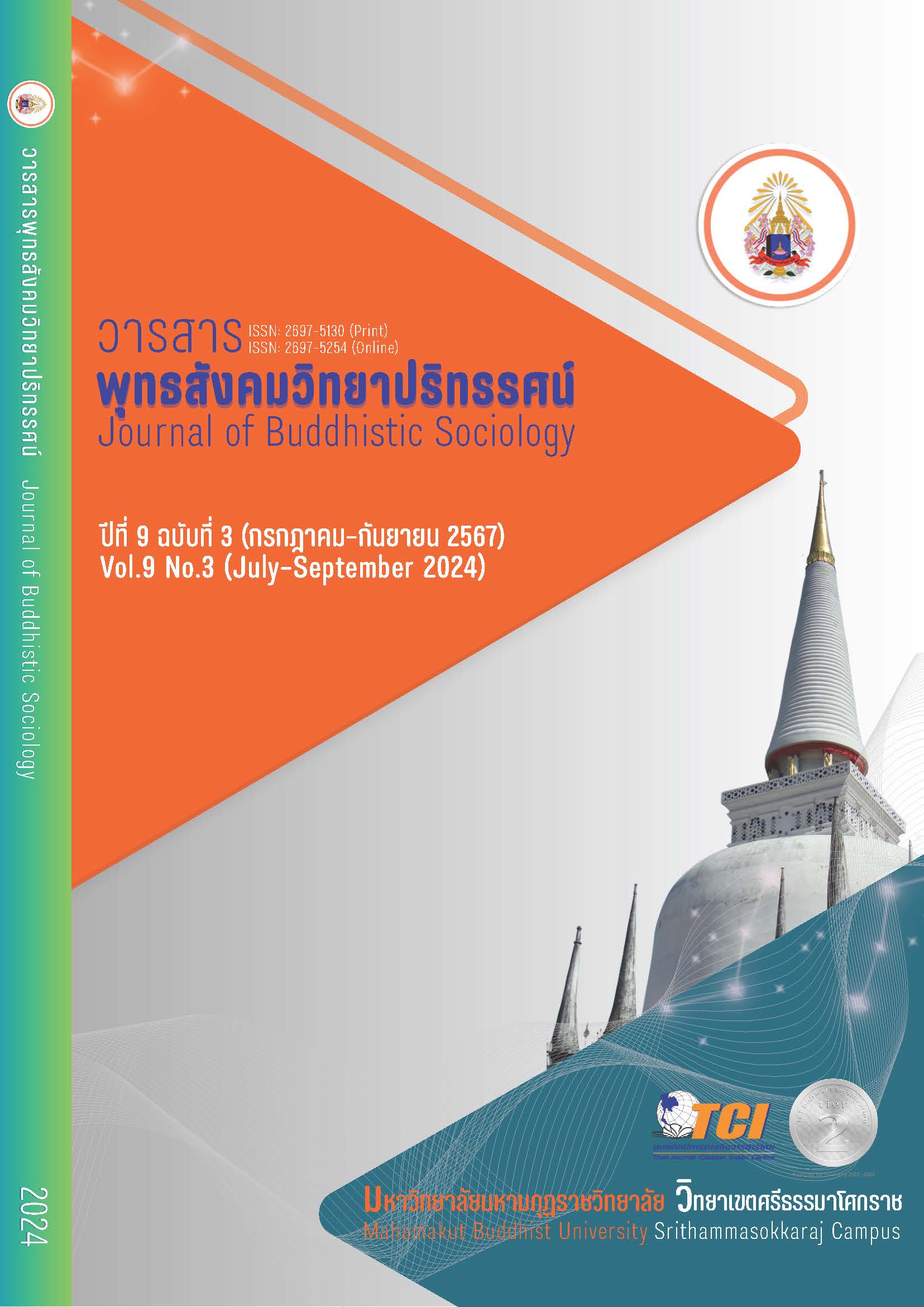RELATIONSHIPS BETWEEN BRAHMAVIHĀRA FOUR-BASED MANAGEMENT OF ADMINISTRATORS AND WORKING HAPPINESS OF TEACHERS UNDER THE SECONDARY EDUCATIONAL SERVICE AREA OFFICE NAKHON SI THAMMARAT
Main Article Content
Abstract
This study aimed to investigate 1) Four Brahmavihāra Dhamma management of administrators. 2) Working happiness of teachers and 3) The relationship between Four Brahmavihāra Dhamma management of administrators and the working happiness of teachers. The sample consisted of 348 teachers under the Nakhon Si Thammarat Secondary Educational Service Area Office in the academic year 2023, selected by proportional stratified random sampling and simple random sampling. The research tool used for data collection was a five-point rating scale questionnaire on the administrators’ management based on the Four Brahmavihāra Dhamma Principles and the teachers’ working happiness. The IOC of the questionnaire ranged between 0.60-1.00, and the alpha coefficients were .892 and .871, respectively. The statistics used for data analysis comprised percentage, mean, and standard deviation. Pearson’s correlation coefficient was employed to analyze the correlation.
The results showed that:
- Overall, the administrators’ management based on the Four Brahmavihāra Dhamma Principles was at a good level in descending order of Loving-Kindness (Mettā), Compassion (Karuṇā), Sympathetic Joy (Muditā), and Equanimity (Upekkhā).
- Overall, the teachers’ working happiness was also high, in descending order of work Achievement, Love of Work, Connection, and Recognition.
- There was a highly positive relationship (r=.820) between Four Brahmavihāra Dhamma Principles management of administrators and the working happiness of teachers, with a significance level of .001. The variance in teachers’ working happiness could be explained by 67.20 (r2=.672) percent of the variance.
Article Details

This work is licensed under a Creative Commons Attribution-NonCommercial-NoDerivatives 4.0 International License.
References
ครรชิต ชำนิประโคน. (2560). ความสัมพันธ์ระหว่างการใช้อำนาจของผู้บริหารสถานศึกษา
กับความสุขในการทำงานของครู สังกัดสำนักงานเขตพื้นที่การศึกษาประถมศึกษาระยอง เขต 1. ใน วิทยานิพนธ์การศึกษามหาบัณฑิต สาขาวิชาการบริหารการศึกษา. มหาวิทยาลัยบูรพา.
ปกธรรม เชาวนกฤษณกุล. (2562). ความสัมพันธ์ระหว่างทัศนะต่อวัฒนธรรมองค์กรกับความสุขในการปฏิบัติงานของครูในจังหวัดภูเก็ต. ใน วิทยานิพนธ์ศึกษาศาสตรมหาบัณฑิต สาขาวิชาการบริหารการศึกษา. วิทยาลัยเทคโนโลยีภาคใต้.
ประภารัตน์ มาลา. (2563). การบริหารตามหลักพรหมวิหาร 4 ของผู้บริหารโรงเรียนตามทัศนะของครู สังกัดสำนักงานเขตพื้นที่การศึกษามัธยมศึกษาเขต 13. ใน วิทยานิพนธ์ศึกษาศาสตรมหาบัณฑิต สาขาวิชาการบริหารการศึกษา. วิทยาลัยเทคโนโลยีภาคใต้.
พระพรหมคุณาภรณ์ (ป.อ.ปยุตฺโต). (2559). พจนานุกรมพุทธศาสตร์ ฉบับประมวลธรรม (พิมพ์ครั้งที่ 34). กรุงเทพมหานคร: มูลนิธิการศึกษาเพื่อสันติภาพ พระธรรมปิฎก (ป.อ. ปยุตฺโต).
สำนักงานเขตพื้นที่การศึกษามัธยมศึกษานครศรีธรรมราช. (2564). รายงานการสังเคราะห์ผลการประเมินตนเองของสถานศึกษา (SAR) ประจำปีการศึกษา 2563 สำนักงานเขตพื้นที่การศึกษามัธยมศึกษานครศรีธรรมราช. เรียกใช้เมื่อ 30 มีนาคม 2566 จาก http://www.infosea12.info/infoonline/images/stories/academicData/sar63.pdf
สำนักงานเขตพื้นที่การศึกษามัธยมศึกษานครศรีธรรมราช. (2566). จำนวนข้าราชการครูและบุคลากรทางการศึกษา. เรียกใช้เมื่อ 3 กรกฎาคม 2566 จาก http://www.sea12.go.th/sea12new/index.php/2018-11-23-08-26-46.html
สำนักงานคณะกรรมการกฤษฎีกา. (2562). พระราชบัญญัติการศึกษาแห่งชาติ พ.ศ.2542 (ฉบับอัพเดท). เรียกใช้เมื่อ 30 มกราคม 2566 จาก https://www.moe.go.th/backend/wp-content/uploads/2020/10/1
Krejcie, R. V. & Morgan, D. W. (1970). Education and Psychological Measurment. New York: Minisota University.
Manion, J. (2003). Joy at Work! Creating A Positive Workplace. Journal of Nursing Administration, 33(12), 652-659.


